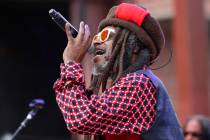Christian rocker fields questions about genre as Casting Crowns comes to Henderson
Ever dance with the devil in the pale moonlight?
Time to rock with Jesus under hot stage lights.
Yes, Jack Nicholson's murderous Joker uttered the former in "Batman." How appalled he'd be by the latter -- but fans will be ecstatic -- when Christian rockers Casting Crowns do just that Sunday at the Henderson Pavilion along with Sanctus Real, The Afters and Lindsay McCaul to promote their "Come to the Well" album.
Devilishly hot in this genre for a dozen years, the seven-member band -- all of whom serve student ministries in their churches -- racked up Grammy, American Music and Dove Awards, selling more than 5 million records and two albums certified platinum, with hits including "Glorious Day," "Mercy" and "Until the Whole World Hears."
Here, Crowns founder/lead singer Mark Hall, who is a youth pastor in Atlanta, talks about the genre:
Question: How do you explain such monster success?
Answer: We're not saying anything deeper or better than anybody else. All our songs come from the things we teach in the church. Artistically, I don't see anything unique about us, so if anything, people connect with what we're saying.
Q: Is the purpose of Christian rock to entertain, proselytize or both?
A: Both. Everybody proselytizes when they sing. I've never bought an album where you don't hear a theme. Everybody has a whale to save. If you talk to somebody long enough, you're going to hear what their thing is. And if it's not something, that's kind of sad. And that's what I hear in a lot of music: Let's party, then party after we get done partying. It's meaningless. I don't want music that just points to where you are, I want to say this is where God wants to take you.
Q: Do you have to be careful that the music doesn't seem sanctimonious?
A: Not really. I tell people if there's a way to mess life up and do it wrong, I have cracked the code. And that's what our music is about. It's about, "Hey, I'm a big train wreck and God rescued me, lets me talk to him and it's amazing." Our music has never been about, "Hey, this is the bad stuff the world is doing." It's, "Hey church, let's take it up a notch here." It's what we call "discipleship": Singing to the church and asking hard questions. Love earns the right to speak truth. People get that from our songs.
Q: What hard questions?
A: On the next record, the first single is "Courage" and it gets into how our generation of men is becoming passionate about things that don't matter and passive about the things that matter most. We're becoming fans of everybody else's adventures, drifting from entertainment to entertainment. Our families and our purpose are being neglected.
There's a song called "Jesus, Friend of Sinners" that talks about how we're running around painting signs telling the world how bad they are, but Jesus never did that. He just had lunch with people, loved them and told them about heaven. If he said anything harsh, it was usually about the church, to straighten it out.
Q: Jesus preached self-sacrifice. Isn't that at odds with the self-indulgent, "me-me-me" rock star life?
A: Definitely. I'm a full-time youth pastor. I meet one on one with 24 kids a week, about 500 students in the student ministry. This is real life for me. We get on the bus Wednesday night after church, roll out and play three cities and then roll back in Sunday mornings.
I see what happens to musicians, living on a bus and all you've got to talk to is your website. You can lose touch. I get home Sunday morning, walk into church and get snubbed by a middle-schooler -- HA! You're signing autographs at 11:30 at night and by 9 the next morning, one of your kids goes, "Oh. Hey."
Q: Should rock stars, secular or not, behave as if they're role models?
A: It's amazing to watch superstar types say they're not role models. I'd think they'd be a little more intelligent. The moment you decide to make money being in the limelight, you agree to the fact that people watch you and pattern themselves after you. There's this feeling you can say whatever you want, but kids are watching and forming. That's a dangerous place to live if you don't know what you're talking about.
Q: Is there pressure by producers and record execs to broaden your appeal beyond a Christian fan base?
A: Nobody has ever said, "You need to tone your lyrics down or be more rockers." The usual discussions we have are, "Can you have us less in the video?" If we do a music video, it's usually a story where people can follow a plot and it leads to some sort of message. But the record company is like, "We are trying to get your name out there so at least show up a little bit." On tour, we have four new videos and we're not in any of them. Just a plot and watching the story of the song.
Q: Isn't that counterintuitive to the entire rock music ethos?
A: What are people going to get out of knowing me? That's just one more person we're putting on a pedestal that we don't think we can ever be like. When you come to one of our concerts, I'm trying to show you 10 reasons why I'm a dork. I talk about my dyslexia and my ADD and failures just to tear all that down.
The goal is for you to understand that God can go home with you when the song is over.
Contact reporter Steve Bornfeld at sbornfeld@review journal.com or 702-383-0256.
Preview
What: Casting Crowns' "Come to the Well" tour, featuring Sanctus Real, The Afters, and Lindsay McCaul
What: 7 p.m. Sunday
What: Henderson Pavilion, 200 S. Green Valley Parkway
What: $21, $29, $46 (702-267-4849)
HendersonLive.com




























